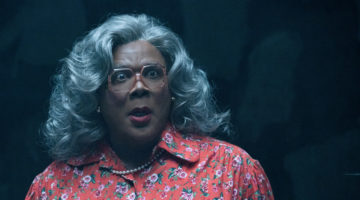Review: The Congress
What could have been a masterpiece just falls short, as Ari Folman’s The Congress reminds us that less really is more. At times the film is perfection, and at others it is a muddle of convoluted, confusing ideas, saturated to the point of distancing the audience from its already crazy premise.
The Congress stars Robin Wright as a fictional version of herself, living in a world where actors can be bought for their image, where a computer can generate performances and they will rake the profits, but never have to act again. A single mother with a sick child to care for, Robin is at first highly skeptical about selling her face to the big movie companies, but eventually chooses family over film, and gives herself to the big screen where she can be manipulated into any character without her own physical presence intact.
The film is split into two parts, the first being live action, and then for some bizarre and unnecessary reason, becomes animated. The first half of the film is brilliant, verging on masterpiece, and contains what will likely be one of the best scenes of the year, when Robin Wright scans her body onto the computer, by giving way all of her expressions within this giant dome that records her every movement. The scene is emotionally powerful and visually stunning, and is a moment that easily elevates the rest of the film. The film becomes animated soon after this scene, and director Ari Folman is some sort of genius at this as proven with his last Oscar nominated film, Waltz with Bashir, an animated documentary about memory loss and a man reconstructing his experience of the 1982 invasion of Lebanon. Folman proves his ambition both visually and thematically yet again with The Congress, but sometimes too much ambition is overkill.
Twenty years after Robin gives herself to the scary computer system that generates performances for her, and just as her contract is about to expire, she is invited to The Congress, an event for such people of the industry like herself. One thing that truly sets it apart, is that entering The Congress means taking a special hallucinogenic drug that turns the world into an animated state. With this, the cartoon version of Robin Wright now exists among fellow animated characters from her life. This is where the film becomes a bit of a mess, filled with plot holes, and way too much to keep up with. There are some amazing moments through the animation, and the look and colour of this segment is fascinating. Folman clearly knows how to execute his animated world. However, it completely diverts from the first half of the film which is much more profound and less in your face or trying. It feels as though Ari Folman wanted to go 120% with his crazy concept, but it actually lessens the impact of the film, which in its live action segment, was quite extraordinary.
This film is reminiscent of such others like Being John Malkovich, which utilizes its meta concept to make a grander statement about the ways of society, humanity, and the future of our world. However, a film like Being John Malkovich leaves a stronger impact because it contains its message instead of driving it insanely into your head. The Congress has one hundred political, meaningful, and insightful things to say. It works as a commentary on Hollywood, on actors, on the movie industry in itself. It conveys the fact that actors really are just puppets for directors, and that in the end, people don’t really have free will when they think they do, and in a sense, we are all just puppets for those who reign above us. The Congress is a deep film, and there is a ton to take out of it. In fact, it demands a re-watch to try and wrap your head around all of its far out concepts and allegories. It is a bizarre and entertaining film, there is no doubt, but had it pulled back and been more dead on with its central message instead of throwing around crazy imagery and concepts to the point where it loses its audience, it could have been a truly magnificent film.
[star v=35]



